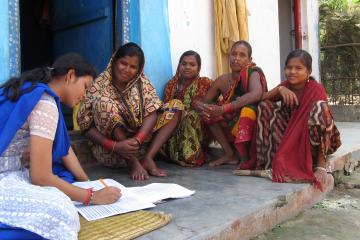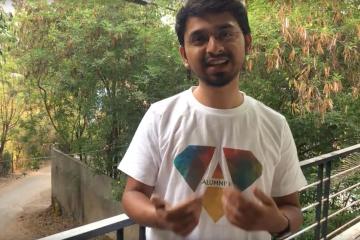
From Goa to New Hampshire, staff trainings build research capacity
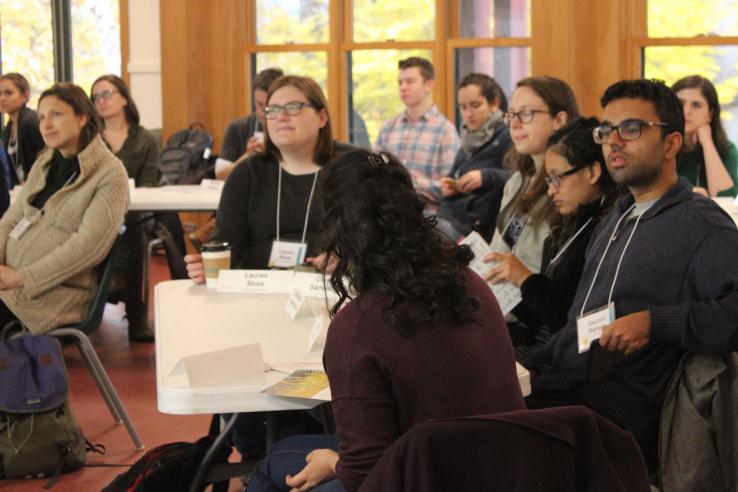
Building research capacity around the world
Since 2003, J-PAL has hosted more than 305 training courses and trained more than 2,600 people. These trainings fulfill one goal of J-PAL’s Research, Education, and Training team—to share best practices with the research staff of our affiliated researchers and partner organizations who are building a body of rigorous evidence on effective ways to reduce poverty. Week-long research staff trainings teach new techniques, share best practices, and provide opportunities for research staff to network and troubleshoot with one another.
Globally informed, locally grounded
Each regional office designs trainings to fit their audience in collaboration with J-PAL Global and other important stakeholders, like Innovations for Poverty Action (IPA). To support J-PAL’s globally informed, locally grounded work, training staff draw on expertise from around the world and tailor sessions to the needs of regional researchers.
Last fall, J-PAL South Asia and J-PAL North America each hosted week-long trainings tailored to their respective contexts and research needs. One hundred participants attended these trainings, most of whom were research associates and research managers who support J-PAL-affiliated researchers in producing high-quality and ethical randomized evaluations.
This year’s US-based training featured a new focus on administrative data, in recognition of its increased use amongst our affiliates, particularly within North America (for example, recent evaluations have leveraged hospital records and data on enrollment in SNAP benefits). As the largest regional office, the J-PAL South Asia training had multiple focal points reflecting the diversity of their projects—from government-researcher partnerships to high quality data collection and management. In both trainings, staff and researchers from J-PAL and IPA led sessions on tools and approaches for conducting randomized evaluations, communicating with stakeholders, and coding in Stata and R, among other topics.
Snapshots from Goa
J-PAL South Asia hosted their 2018 Research Staff Training on the coast of Cavelossim, Goa, from September 9-14, 2018. More than fifty participants from nine countries traveled to Goa where they attended lectures covering topics such as questionnaire design, project management, protocols for data quality and security, field team management, ethics, and effective communication with stakeholders. Lab sessions focused on building skills; experienced teaching assistants guided participants through Stata and R code exercises, IRB applications, and coding a survey into SurveyCTO.
The majority of participants in attendance work on projects that use survey data, and the training reflected this work.
- The Respondent Tracking and Data Quality Assurance lecture stressed the importance of collecting both complete and high-quality data, and shared tools for respondent tracking and spot checks.
- Field Team Management taught participants how to recruit, train, and structure a field team to ensure the collection of complete and high-quality data. These skills and insights are highly sought after by principal investigators (PIs) and research managers but often are not part of undergraduate economics curricula.
In the Communicating with External Partners presentation, J-PAL South Asia Senior Policy Manager Gautam Patel armed participants with strategies and tools for interacting with a wide range of external partners. Gautam suggested that participants draw a blueprint of meetings with external partners to visualize the meeting ahead of time and encouraged participants to draw the best-case-scenario result of the meeting. Drawing on his years of working with the J-PAL South Asia Policy team, he emphasized the need to be prepared, adaptable, and informed in order to build fruitful partnerships. The presentation also gave guidelines on the time and effort required to build a relationship and when to move onto a different relationship.
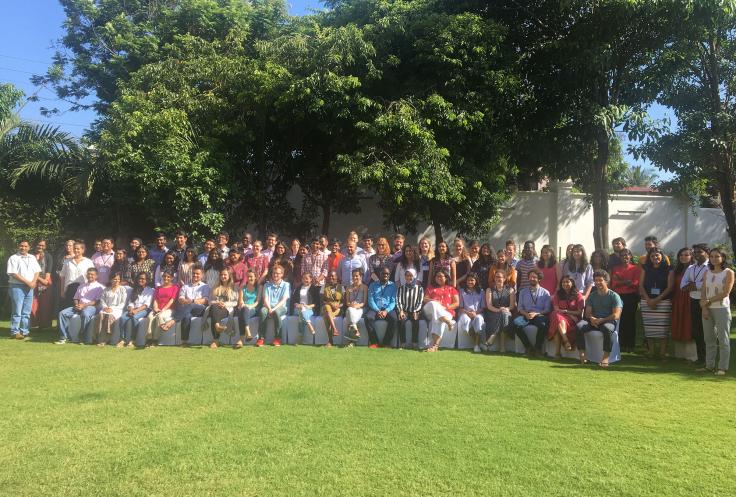
The training included a project fair where participants had the opportunity to showcase the research projects they were working on. Participatory workshops and group projects encouraged participants to share skills and solutions to common challenges of running randomized evaluations.
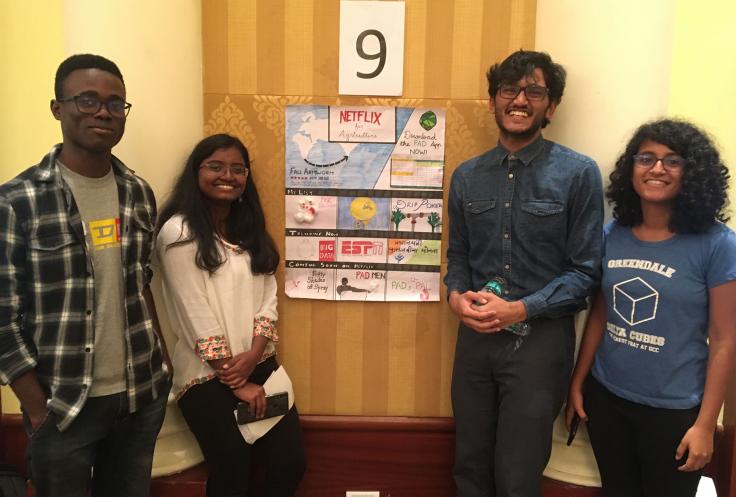
In spite of the rigorous demands of the training, participants still found time to relax and have fun. On the final night of the training the participants and trainers came together for one last dinner, followed by a dance. Three participants celebrated their birthdays during the training, so the group joined in celebrating these as well.
Snapshots from New Hampshire
In November 2018, J-PAL North America hosted its week-long Research Staff Training in Greenfield, New Hampshire. Participants at the training came from ten countries, represented eight research organizations, and worked on research projects in over twelve countries. This diversity of projects and perspectives allowed participants to share expertise from research areas that included youth jobs programs, anti-violence interventions, and complex medical care.
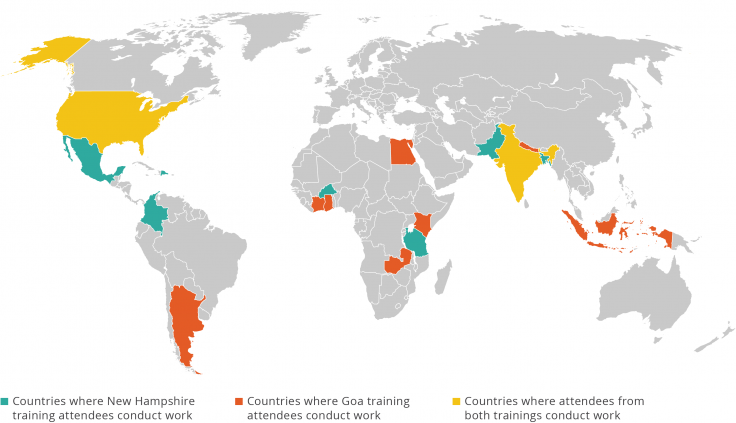
Mary-Alice Doyle, a Research Manager at J-PAL North America, shared new insights on working with administrative data and led a workshop where participants worked in groups to design a data flow for a hypothetical study using administrative data.
Bruce Sacerdote, the Richard S. Braddock 1963 Professor in Economics at Dartmouth College and a J-PAL affiliated researcher, brought enthusiasm and openness to a lecture on running a randomized evaluation from a primary investigator’s perspective. He gave examples of everything that went contrary to plan in an evaluation of a college mentoring program and explained how the research team addressed each challenge.

Participants gathered outside at Research Staff Training in New Hampshire. Photo: Lindsey Shaughnessy | IPA
Outside of each day’s sessions, participants connected over meals and walks along the lake at the Barbara C. Harris Camp & Conference Center. On the last night of the training, participants and trainers celebrated their time together over a bonfire where some participants enjoyed s’mores for the first time.
As participants return to their work, which elements of the training prove to be most valuable?
While establishing a common base of knowledge about randomized evaluations, the trainings accommodated a range of pre-existing skills; both trainings included self-paced Stata labs with support from trainers, and the North America training provided some split tracks for participants with different research interests. Many participants indicated that they will immediately be able to apply what they learned. One person described the training as providing a “comprehensive set of tools.”
Across both trainings, participants ranked sessions on High-Frequency Checks and Backchecks and Coding Best Practices to be among the most useful. In New Hampshire, participants also found the sessions on Communicating about Power and SurveyCTO to be highly applicable to their work, while in Goa, Gautam's session on Communicating with External Partners received high praise. Participants of both trainings left with a USB drive containing software, do files, and survey forms used in the training sessions, and will be able to apply these in their daily work.
Join J-PAL at other training events
For readers interested in participating in a J-PAL training, there are a variety of opportunities for researchers and non-researchers alike to get involved throughout the year. Some options include:
- Participating in one of J-PAL’s week-long trainings on Evaluating Social Programs, which take place across the globe and are targeted at leaders in nonprofits, government, and the private sector.
- Taking one of J-PAL’s online courses, including an interactive, self-paced version of Evaluating Social Programs which counts towards the MITx MicroMasters credential in Data, Economics, and Development Policy.
Future staff training dates
At both J-PAL South Asia and North America, staff are already looking forward to next year’s trainings and are always happy to hear from past participants about their work. If you would like to share an update on your work or share insights or tools, please reach out; we would love to hear from you.
| Host | Location | 2019 |
| IPA Kenya | Nairobi, Kenya | April 7-12 |
| J-PAL South Asia | India | September 8-13 |
| J-PAL Global and J-PAL North America | Greenfield, NH, USA | October 20-25 |


